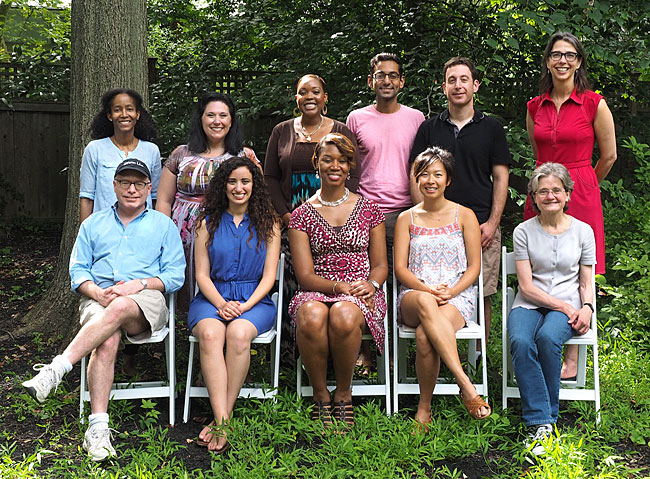News
Penn’s New National Clinician Scholars Program Welcomes First Cohort
Also Named as New LDI Fellows, The Seven Include Physicians and Nurses

The faculty and inaugural scholars of Penn’s new National Clinician Scholars Program gather at a welcoming party. (l to r, rear): Raina Merchant, MD, NCSP Co-Director; scholar Danielle Erkoboni-Wilbur, MD; scholar Tiffany Montgomery, PhD, RNC-OB, C-EFM; scholar Chethan Bachireddy, MD; scholar Joshua Rolnick, MD; Judith Long, MD, NCSP Co-Director; (seated): David Asch, MD, NCSP Co-Director; scholar Stacey Kallem, MD; scholar Esther Smith-Howell, PhD, RN; scholar Jane Zhu, MD, MPP; and NCSP Co-Director Julie Sochalski, PhD, FAAN, RN. [See full bios of all here] Also, see larger photo.
The University of Pennsylvania Perelman School of Medicine marks the opening of a new era with the arrival of the first students for its new National Clinician Scholars Program (NCSP).
Along with orientation on campus, the seven inaugural NCSP scholars were also hosted at a welcoming weekend garden party at the Philadelphia home of Penn Medicine Assistant Professor of Emergency Medicine and NCSP Co-Director Raina Merchant, MD.
RWJF program successor
The NCSP is the successor to the Robert Wood Johnson Foundation (RWJF)-funded Clinical Scholars program that operated since the 1970s with substantial support from the Department of Veterans Affairs. The close of that RWJF program was announced in February 2014. A year later, the four universities currently supported by RWJF (Penn, Yale University; the University of California, Los Angeles; and the University of Michigan) announced the creation of their own consortium to continue the traditional mission of clinical scholars.
This year, both programs overlap at Penn as the last RWJF two-year cohort moves toward its final term in 2017 and the first year of the new NCSP begins.
“We can judge the enormous value of the four decades of the Clinical Scholars Program by the number of today’s leaders who were produced and shaped by the program or by the program’s profound and enduring influence on the structure and goals of public and private systems that support health and health care,” said NCSP Co-Director David Asch, MD, MBA.
Four decades of success
“But,” Asch continued, “perhaps the best market test of the program’s value is this: As soon as RWJF announced plans to end the program, the four universities and the Department of Veterans Affairs looked for ways to continue it. So, as we celebrate the arrival of our first cohort of National Clinician Scholars, we are also celebrating four decades of success from the Clinical Scholars Program that came before.”
While similar in content and spirit to the RWJF program it replaces, the NCSP has made a change to foster interdisciplinary proficiency by opening itself to nursing scientists as well as physician scientists.
As with the previous program, Penn NCSP scholars also become Fellows at Penn’s Leonard Davis Institute of Health Economics (LDI), a major national hub of health services research. All NCSP faculty members are LDI Senior Fellows.
Equity, innovation, quality
The traditional Clinical Scholars concept was designed to produce an elite cadre of health care leaders. Carefully chosen post-resident physicians with a bent for health services research were provided two years of protected research time along with intensive professionalism and leadership training in a program that produced some of the country’s most distinguished health care authorities.
The stated goals of the new NCSP program clearly skew toward the overarching goals of our time: “cultivate health equity, eliminate health disparities, invent new models of care, and achieve higher quality health care at lower cost by training nurse and physician researchers who work as leaders and collaborators embedded in communities, health care systems, government, foundations, and think tanks in the U.S. and around the world.”